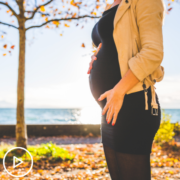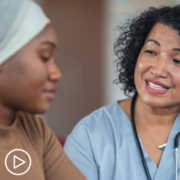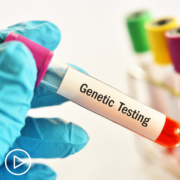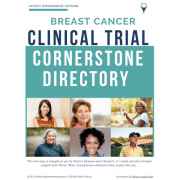Breast Cancer Before 40: How Can I Preserve My Fertility?
Breast Cancer Before 40: How Can I Preserve My Fertility? from Patient Empowerment Network on Vimeo.
Dr. Stephanie Valente discusses fertility preservation in breast cancer patients under the age of 40 and the potential for pregnancy following treatment.
Dr. Stephanie Valente is the Director of the Breast Surgery Fellowship Program at Cleveland Clinic. More about this expert here.
Related Program:
Transcript:
Dr. Stephanie Valente:
So, another issue that is really important for young women is discussing fertility preservation. And this really needs to happen at the time of their diagnosis. So, we know that the cytotoxic agents that we can give females just through chemotherapy can decrease the ovary and the ability for these women to have menstrual periods after chemotherapy. So, the ability for them to get pregnant naturally.
As well as some of the medications. So, somebody who has a breast cancer that is estrogen positive, the recommendation is for these women to be on hormone suppressant medicine for five to 10 years after their breast cancer diagnosis and treatment, therefore not being able to be pregnant while on these medications. So, talking with young women when they get diagnosed about their family planning and their fertility options up front before they have surgery or chemotherapy is really beneficial.
And whether or not they need to see a fertility preservation specialist. If they want to consider IVF. Or if they have a gene, looking at genetic testing for their future offspring. So, these are all conversations that really need to happen before these women begin chemotherapy if they need it.
And the good thing is that at the young women’s clinic, these fertility specialists are embedded in the clinic. So, they are able to get an appointment with them right away. And a lot of times if these women do want to undergo fertility preservation, that can happen within 10 days of seeing the specialist. So, it really doesn’t delay their care. And we do know that it is safe even with the breast cancer diagnosis.
The other thing is that we do offer a medicine which is a GRNH agonist which will kind of essentially shut down the ovaries during chemotherapy to help protect them so that when a young woman is done with chemotherapy, it helps the ovary kind of get back to normal a little bit sooner.
So, it sounds good in theory. Unfortunately, it’s not something that is covered by insurance companies right now. And so, fertility preservation is expensive. And so, the good thing is there are a lot of groups that put together packages and stuff for these young women to be able to afford it. But it is pretty pricey. So, for those that can afford it, it is a great option. And a lot of them do take advantage of it. I think there are a lot of misconceptions about it. Number one is that patients don’t really know if it’s safe.
Number two, they are scared about their overall diagnosis and a potential delay and 10 days might make some of them afraid that doing that is a good option. Another thing is when these women come in with a diagnosis of breast cancer, they see a surgeon, a medical oncologist, a radiation oncologist, a plastic surgeon.
And so a lot of times an extra appointment at that point in time is just really overwhelming for these women. So, our goal is to kind of refocus and say, “Hey, the good news is that with our modern therapies you’re going to be here for a long time. So, let’s plan for the future now so that in the future you’ve got options.”










